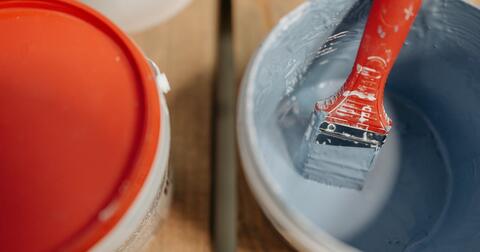Michigan lawmakers propose a new tax for paint, citing need for lead abatement
Reported cases of lead poisoning dropped by more than half between 2012 and 2022
Michiganders could pay more for paint in the future if House Bill 5370, introduced by Rep. Rachel Hood, D-Grand Rapids, becomes law. The bill, which Hood introduced Nov. 14, would impose a 25-cent-per-gallon excise tax on five-gallon buckets of paint and related products that are used for residential and commercial buildings (architectural paint). The tax would go on top of the current sales tax and would also apply to containers of less than five gallons.
The money generated from the new law would be deposited in a restricted account to fund lead abatement in residential dwellings, according to a press release from House Democrats. The bill has 19 co-sponsors, all Democrats.
The tax would be levied on Michigan-based paint manufacturers, Michigan wholesalers who sell paint manufactured outside the state, and anyone who goes out of state to purchase paint manufactured there. Those who sell paint to others would be explicitly allowed to add the excise tax to the sales price. The House Fiscal Agency has not published an estimate of how much money the state would collect under the tax.
Michael Van Beek, director of research at the Mackinac Center for Public Policy, has questions about the bill:
- How much revenue will this generate? Will it be enough to cover the costs of lead abatement?
- Might paint manufacturers avoid the tax by producing paint in containers larger than five gallons?
- The percentage of children in Michigan testing for elevated levels of lead in their blood has been cut in half between 2012-22. Why is this tax necessary?
- Gov. Gretchen Whitmer just noted that the Michigan Housing Development Authority plans to help finance 10,000 new housing units. Won’t increasing the cost of paint make that project more expensive?
Lead paint was banned in the United States in 1978. State law requires the Michigan Department of Health and Human Services to report to the Legislature each year the number of children tested for lead poisoning, and the number with an elevated blood level.
There were 148,779 children tested for lead in 2012 and 4.6% of them had elevated blood levels of more than five micrograms per deciliter. The number of children tested dropped to 100,830 in 2022, with the percentage reporting an elevated level of blood at 2.1%.
Hood did not respond to an email seeking comment.
Michigan Capitol Confidential is the news source produced by the Mackinac Center for Public Policy. Michigan Capitol Confidential reports with a free-market news perspective.

